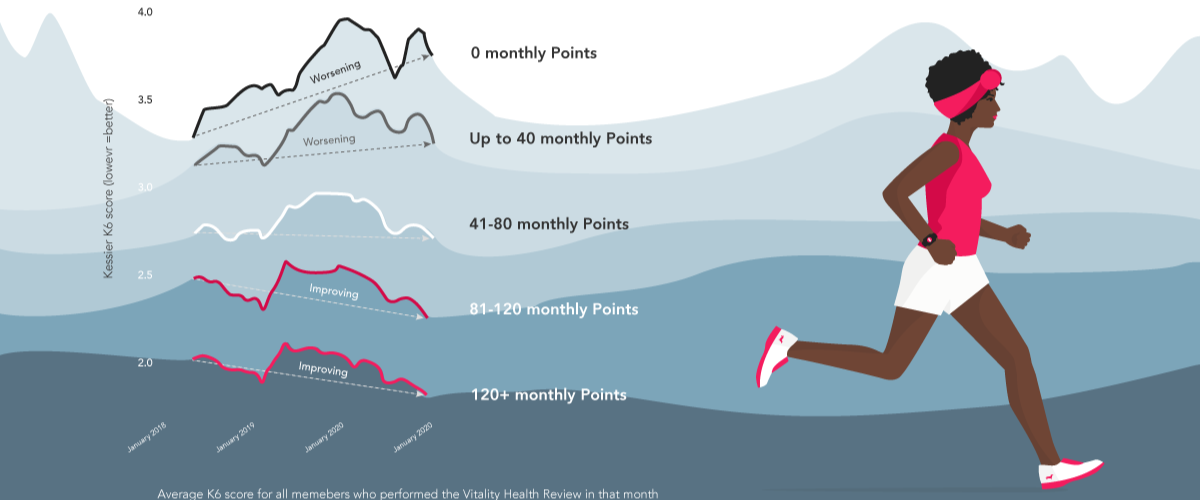Feeling blue? How physical activity can help with your mental health
Vitality Magazine explores how getting active can help with your mental wellbeing as the darker nights draw in

Transitioning to the darker months can be tough on all of us, not least for those who struggle with mental health challenges.
And while the first frost might not have hit the UK just yet, the drawn-out evenings are a signifier that they are not too far away.
Symptoms of anxiety and depression, such as feeling nervous or tense, or feeling hopeless and pessimistic, can be exasperated by the seasonal change – known as Seasonal Affective Disorder (SAD) – as the lack of daylight impacts our mood, along with colder weather that makes it less appealing for us to go outside.
And with 60% of UK adults admitting that anxiety impacts their daily lives, according to UK charity Mental Health Foundation, it’s really important to feel equipped on how to cope during these months in order to enjoy them to the full.
“The transition into the winter months can affect us all, with the harsher weather and shorter, darker days naturally dampening our spirits,” says Dr Sophie Mort, Clinical Psychologist and Mental Health Expert, at Vitality partner Headspace.
“But for those who might already struggle with mental health challenges, this seasonal shift can take an even bigger toll on our mental wellbeing.”
Not to mention rising energy costs and increasing pressure on healthcare systems, all of which are having adverse effects on people’s mental health, says Dr Sophie.
Get the right mental health support for you
At Vitality, we understand the importance of taking control of your health. That’s why we offer mental health support for our members through our insurance plans.
To access support and care for your mental wellbeing, log into Member Zone, where you will find a number of options; whether you need urgent help, online support or want to access counselling sessions. Qualifying plans apply.
Or, if you are not a Vitality member and want to find out more about our plans, visit vitality.co.uk.
Get active for your mental health
Vitality data shows that physical activity and mental wellbeing are intrinsically linked.
According to findings, members who exercise at least three days every week were found to have a 10% lower risk of anxiety and depression compared with less active members[1].
Simultaneously, members who are active were more likely to improve their mental wellbeing over time. This was spurred on by continuing engagement in the Vitality Programme.
The benefits of physical activity have been so well documented that exercise is now being prescribed by GPs for people who suffer from mild to moderate symptoms of mental ill-health.
Meanwhile, a recent study found that group running two to three times a week delivers the same mental health boost as a course of antidepressants.
However, research conducted by ukactive last month found that 75% of Brits underestimate the 150 minutes of moderate to intensive exercise recommended by the NHS. Instead, around 40% thought 90 minutes of activity would be enough.
But with winter the foe of the fair-weather exerciser, it can make motivation an uphill battle.
Dr Sophie says: “The winter weather might not have you feeling motivated to get to the gym, but if that’s the case, try stripping it back.”
So, before we sink even deeper into the darker months, here are some ways for you to kick-start getting active.
4 simple tips to help you get active
Take small, actionable steps
If you can’t dedicate hours at a time to exercise, short, ‘snackable’ bursts of fitness – whether that’s a 15-minute HIIT workout in your lunch break or walking the stairs rather than taking the lift at the office – shouldn’t be sniffed at.
Find your way
Before you embark on your next piece of exercise, whether that’s a run around the park or donning trainers to run an errand.
Build activity
Think about building less structured activity into your week. Is there a part of your work commute that you could be more active, for example?
Is there a section you could walk, cycle or jog, or could you get off the bus or train one stop before you need to? Or could you walk and talk when making a call?
Try something new
When it comes to finding the right activity for you and your routine, Head of Exercise and Physical Activity at Vitality, Jonny Kibble, advises to simply: “Do something you enjoy.
”It could be something as simple as buying a skipping rope or throwing a frisbee in a near-by park.Gyms are also a great place to find new activities to try where there are experts on hand to help you.
Beyond physical activity
Of course, there’s no silver bullet to remedy mental health challenges, and there are other factors to recognise in order to combat feelings of anxiety and depression.
Studies have shown that mindfulness can reduce symptoms of depression and anxiety – and Vitality members are proving the theory.
27% of our members who use the Headspace app were found to have greater improvement in their mental wellbeing over time, compared with those who did not use the platform[2].
 To help maintain our mental health during tough times, Dr Sophie also recommends:
To help maintain our mental health during tough times, Dr Sophie also recommends:
Be aware of your triggers: Is it that you experience SAD due to the weather? Or do you tend to feel anxious when there are too many work pressures and social pressures around Christmas time? Once you know what tends to make your mood change you can start to plan ahead to manage those triggers.
Create a list of coping skills: Ensure to make time in your calendar to do those things. This is a high priority. Also, factor in time for exercise, eating and sleep so that you have your best chance at feeling good. If you don’t know what coping skills work for you, try exercise, a meditation practice or speak to a professional.
Focus on your support network: Engage with friends and family regularly. Being around people we care about helps decrease stress, helps boost feel-good chemicals in the brain and boosts our self-esteem.
Talk to someone: Share with a trusted friend how you are feeling, keep the conversation going so that you know you are not alone while moving through this season. Seek professional support if your symptoms intensify or get in the way of your ability to carry out your normal day to day activities.
Healthcare at your fingertips
Vitality members with our health insurance can access eight online or face-to-face Talking Therapies sessions per plan year. Talking Therapies include counselling and cognitive behavioural therapy (CBT).
Book your virtual or in-person Talking Therapies appointment through Care Hub or via the Vitality GP app.
Life insurance members that notify us of a mental health-related claim can also get access to Talking Therapies through the Recovery Benefit as part of Income Protection. Terms and conditions apply.
You can also access everything you need to know about your plan via Member Zone or in the Vitality Member app.[1] Vitality research into Vitality Programme data 2023
[2] Vitality research into Vitality Programme data 2023
Recent articles

Feeling lonely? 4 ways to combat loneliness this season
For all the fun and frolics of the festive season, for many it can bring an equal amount of heartache. So, why not lift your - or someone else’s - spirits this time of year with these simple tips?

The way to avoid festive burnout? Just say ‘no’
For all of its fun, the festive period can be incredibly stressful too. Hoping to escape burnout this holiday season? Try saying ‘no’, writes Jennifer Wallis

What’s holding women back from getting active this winter?
Less than one in four women hit the recommended weekly exercise guidance – why? We asked women’s personal trainer and founder of LDN MUMS FITNESS, Sarah Campus

